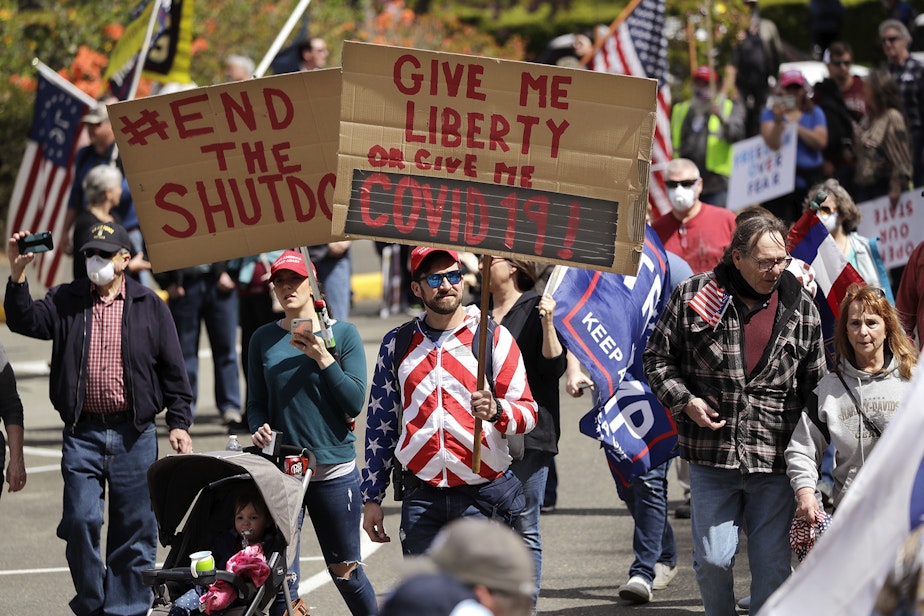Legally speaking, can counties, sheriffs, and others defy Washington's stay-at-home order?

In response to recent challenges and protests of Washington's stay-at-home order, King County Executive Dow Constantine told KUOW's Bill Radke that "your right to go out and be reckless does not trump my right be safe from you, to not be infected by you, to have my family be protected from your irresponsibility."
It prompts the question: How solid are the legal arguments against the stay-at-home order?
Former Washington state Attorney General Rob McKenna followed up with Radke on The Record to clarify.
"Our constitutional rights to gather and peacefully assemble can be overridden by larger concerns," McKenna explains. "As long as those concerns are strong enough to justify the limitation of our constitutional activity."
In short, the various arguments against the stay-at-home order aren't likely to hold up in court. But there is nuance, and perhaps no actual legal mechanisms in some cases.
McKenna's legal perspective comes from his experience as a former Washington state attorney general. He was also once a Republican candidate for governor.
Franklin County reopens its economy
The Franklin County Commission recently voted to reopen its economy in defiance of the statewide order. The commission said that the order is unconstitutional.
“Franklin County’s commission does not have that authority," McKenna said. "Put aside the fact that it is not their role to deliver opinions on the constitutionality of law, that’s for the judiciary …. counties in Washington are sub-units of state government. They are creatures of the state government; all of their powers come from state law. It’s clear that when the governor acts, it supersedes any action of the county."
For example, before Inslee issued the stay-at-home order in March, Yakima County issued its own. Once the governor signed his order, that overruled the county's.
Gov. Inslee addressed the issue Wednesday evening, and noted that Franklin County is not the only county to question the stay-at-home order. He said his office is reaching out to such jurisdictions:
"... to make sure that there is clarity about the orders as well as the underlying legal and constitutional grounds. They give the governor's office the authority to impose restrictions to protect the health of Washingtonians in emergencies. I also appreciate the cooperation of local jurisdictions, who originally have had some questions about the orders. We've seen some local jurisdictions like the City of London, and Blaine County and Douglas County, who've issued resolutions or guidance to allow for construction in a way that they believed was consistent with our orders. And when my office contacted them to express concerns about their interpretation, they were willing to rescind their orders and work with our office, and I appreciate their cooperation in good faith efforts. These are examples of strong leadership."
Religious rights
Republican gubernatorial candidate Joshua Freed has sued Gov. Inslee, arguing that the stay-at-home order violates people's religious rights, preventing them from gathering for religious purposes.
“I don’t think it’s that strong and here’s why," McKenna said. "The test you apply to a government action to decide whether or not it violates the free exercise clause, is whether or not the religious activity or the religion itself is being targeted. When you promulgate a law or regulation that applies to everybody, and it isn’t targeting religion in particular, it’s legitimate when it’s in the nature of protecting public health and safety."
For example, churches are required to construct their facilities under certain fire safety codes. Those apply to everyone.
"They can’t claim it’s a violation of their constitutional rights if they have to install a sprinkler system, because it’s a requirement that applies to all buildings of a certain size.”
On top of that, if the case ever made it to court, McKenna believes the state would argue that religious services are not prevented through the order — they can still conduct online services, or as some congregations have done, over the radio.
Snohomish County Sheriff
The case of Snohomish County Sheriff Adam Fortney is where more nuance comes into play. Fortney has publicly stated that he will not enforce the order.
Can a sheriff do that?
“Yes," McKenna said.
McKenna explains that a violation of the order is a gross misdemeanor. Law enforcement officials, such as sheriffs, often make decisions on how to implement the law: who to investigate, who to arrest, and who to refer for prosecution.
A similar situation has popped up regarding some Washington sheriffs refusing to enforce the gun regulation, I-1639.
"I’ve heard the current attorney general (Bob Ferguson) state in connection with the gun safety initiative that was adopted by voters — when sheriffs said they would refuse to enforce it — that somehow they could be forced to enforce it or be sanctioned. I don’t know what that would look like," McKenna said.
"I don’t see how you would sanction a sheriff or prosecute a sheriff for not enforcing the law. That’s a pretty serious slippery slope. We rely on police and sheriffs all the time about how to enforce the law … same with prosecutors. They don’t prosecute every crime, they have to make a decision. So I don’t think there is an avenue to force the sheriff to enforce the proclamation.”
Clarification: Attorney General Bob Ferguson sent an open letter to sheriffs saying they have the discretion to prioritize their enforcement resources, except background checks. He stated those who refuse to perform the background check, required by Initiative 1639, could be held liable if there is a sale or transfer of a firearm to a dangerous individual prohibited from possessing a firearm and that individual uses that firearm to do harm.





